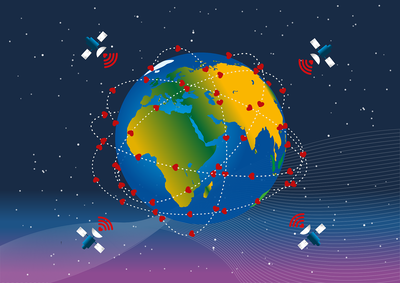
China has begun production of its second low-earth satellite megaconstellation in Shanghai, aiming to provide broadband internet services and compete with SpaceX's Starlink. The project, situated within the G60 Starlink industrial base, plans to launch and operate 108 satellites for initial commercial services by 2024. Shanghai Gesi Aerospace Technology, a state-owned entity, expects an annual production capacity of 300 satellites, with a reduced production time of one and a half days. This initiative reflects China's commitment to the space technology industry and its efforts to cultivate the commercial satellite market.
Elon Musk’s Starlink has been working on providing satellite-based internet in quite a few countries. Now, China is gearing up to take on Starlink with its own satellite-based internet service. According to a report by South China Morning Post, production of China's second low-earth satellite megaconstellation, aimed at providing broadband internet services, commenced in Shanghai on Wednesday. This initiative reflects China's commitment to exploring opportunities in the space technology industry, intensifying competition with SpaceX's Starlink.
Situated within the G60 Starlink industrial base, supported by the Shanghai municipal government, a digital-production plant achieved a milestone by producing its inaugural commercial satellite on Wednesday, as reported by authorities in the Songjiang district. As per the report, the factory aims to launch and operate a minimum of 108 satellites for initial commercial services by 2024. The idea is to establish a comprehensive industry chain capable of global competition by 2027, as outlined by the district government.
Shanghai Gesi Aerospace Technology
, a state-owned entity formed in 2022 to manage the G60 Starlink factory, anticipates an annual production capacity of 300 satellites. General Manager Cao Jin noted that mass production capabilities would significantly reduce satellite production time from approximately two to three months to a mere one and a half days, according to the report. However, this output pace lags behind SpaceX's Starlink, which produces six satellites daily.
China has strategically intensified efforts to cultivate the commercial satellite market, recognizing its pivotal role in frontier technology amid escalating competition with the United States. The G60 Starlink project, comprising 12,000 satellites, and the
Guo Wang
national network, with 13,000 satellites under construction, collectively represent China's response to Elon Musk's Starlink.
Projections by
China Fortune Securities
indicate that China's aerospace information industry is poised to reach 44.69 billion yuan (US$6.26 billion) in 2025, up from 29.3 billion yuan in 2021. Research also reveals that the aerospace information industry commands a 73% share of the global commercial space market, valued at approximately US$384 billion in 2022, noted the report.












 English (US) ·
English (US) ·